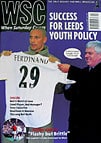 Craig Ellyard reports on NTL's agreement to screen the Football League
Craig Ellyard reports on NTL's agreement to screen the Football League
Communications giant NTL may have pulled out of their pay-per-view deal with the Premier League, but they are still set to play a major role in the lower divisions. The company has an arrangement with the Football League to provide an exclusive internet “portal” for the clubs outside the Premiership in return for a payment of rights fees which could total up to £65 million.
Given they often have to feed off the scraps the Premiership big boys leave behind, the smaller clubs have embraced their new benefactor enthusiastically. Quoted in an NTL press release Brian Phillpotts, the commercial director of the Football League, was positively gushing in his excitement: “This deal will provide the fans with unrivalled content and e-commerce opportunities via one portal."
On the face of it, then, all seems well. The clubs have already banked a sizeable advance and even confirmed Luddites such as Crewe and Hull City, who hitherto had stubbornly refused to acknowledge the presence of the internet, will shortly unveil new websites. The clubs have a bit of cash and NTL, already the third largest internet service provider in Britain, has potential access to “six million dedicated fans of the Football League”.
The problem is the exclusivity of the arrangement. Before the start of the season, some clubs circulated the webmasters of unofficial sites with dire warnings of the consequences should any material be “borrowed” from official sites. The clubs, and presumably NTL themselves, want to ensure web surfers visit the official pages for their news rather than a site produced in someone’s bedroom.
It is not just the small fry who are being targeted. Rothmans Football Yearbook, as far removed from websites and fanzines as an “unofficial” publication can be, is in crisis after the League instructed its member clubs not to provide the publishers with any information because they feared it might appear, unauthorised, on the net.
NTL are a major figure in digital broadcasting, with plans to offer video on demand through their digital platforms. It is reasonable to suppose those plans will eventually include internet broadcasting of Football League games on a subscription basis. To make this viable, NTL and the clubs would have to extend their exclusivity policy.
This could have unexpected implications. Most daily newspapers, knowing they can’t compete for immediacy with websites, have begun posting copy on their own online outlets. It is not beyond the bounds of possibility that the clubs could eventually interpret this as a threat to their own site and curtail access to grounds for the press. And what about the BBC? Local radio is the traditional recourse for fans unable to get to a game, but NTL are a major backer of the digital company Radio First. The potential is there for further conflict.
The clubs themselves may have begun to realise that the internet is not, after all, paved with gold. In the euphoria surrounding the NTL tie-up there was talk of clubs receiving regular payouts of up to £50,000. However, with clubs generating revenue per hit, their income is more likely to be in pence than big bucks. The persecuted young webmaster in his back room may yet have the last laugh.
From WSC 167 January 2001. What was happening this month